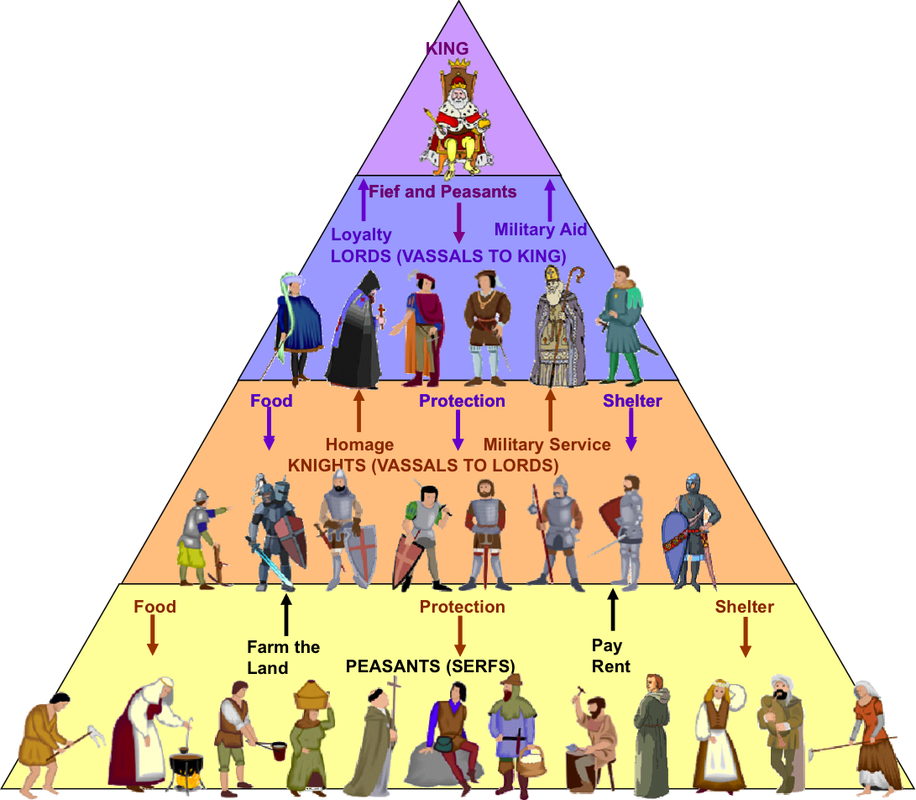
This was the system of service in return for a grant of land, burdening the peasant with many obligations to his lord. It has been argued that the Black Death brought about the end of feudalism.

But all too often the administration consists of noting defaults of rent because of plague (defectus causa pestilencie). The bulging piles of manorial accounts which survive for the period of the Black Death testify to the active land-market and the additional administration caused by the onset of plague. Landlords gained in the short term from payments on the deaths of their tenants (heriots), but 'rents dwindled, land fell waste for want of tenants who used to cultivate it' (Higden) and '.many villages and hamlets were deserted.and never inhabited again'. Despite the shortage in the workforce caused by the plague, workers were ordered to take wages at the levels achieved pre-plague. This law sought to prevent labourers from obtaining higher wages. Within a year of the onset of plague, during 1349, an Ordinance of Labourers was issued and this became the Statute of Labourers in 1351. Some elements of legislation indicate a measure of panic. The rulers of the kingdom reacted strongly. Despite all their best efforts people in the historic period had no remedy against the mysterious plague, except as Daniel Defoe put it, to run away from it.įollowing the plague we find a clear sense of society turned upside down in England. It was not until these modern outbreaks that the bacillus was identified and connection between rats and plague discovered. But by around 1670 it disappeared from England for over two centuries until a number of outbreaks occurred either side of 1900. We also know that the plague returned regularly, first in 1361 and then in the 1370s and 1380s and, as an increasingly urban disease, right through until the Great Plague of 1665 in London. Some treated each day as if it were their last: moral and sexual codes were broken, while the marriage market was revitalised by those who had lost partners in the plague. We also know that the mortality came to an end in the first outbreak soon after 1350 contemporaries could not have known this would happen - so far as they were concerned everyone might well die. We know, as fourteenth-century people suspected, that the mortality caused by the bubonic plague of the Black Death was the worst demographic disaster in the history of the world. In London the pits took the form of long, narrow trenches with bodies laid in orderly rows: at Hereford the evidence was of more haphazard committal to the earth. Modern excavation of such pits in London, near The Tower on the site of former Royal Mint and in the cathedral close at Hereford, testify to these extreme measures. At Rochester (Kent) men and women cast their dead children into communal graves 'from which arose such a stench that it was barely possible to go past a churchyard'. The plague did not abate in the Winter but became even more virulent in the early months of 1349 and continued into 1350.Ĭhroniclers and administrators make numerous references to the extension of graveyards, for example in Bristol, and to the mass burial of bodies in pits. The Malmesbury monk, writing in Wiltshire, reckoned that 'over England as a whole a fifth of men, women and children were carried to the grave'.


The phrase 'there were hardly enough living to care for the sick and bury the dead' is repeated in various sources including a chronicle compiled at St Mary's Abbey, York. His analysis of the scale of the mortality is repeated by other commentators. Ralph Higden of Chester, the best known contemporary chronicler thought 'scarcely a tenth of mankind was left alive'. Contemporaries were horrified by the onset of the plague in the wet summer of 1348: within weeks of midsummer people were dying in unprecedented large numbers.


 0 kommentar(er)
0 kommentar(er)
